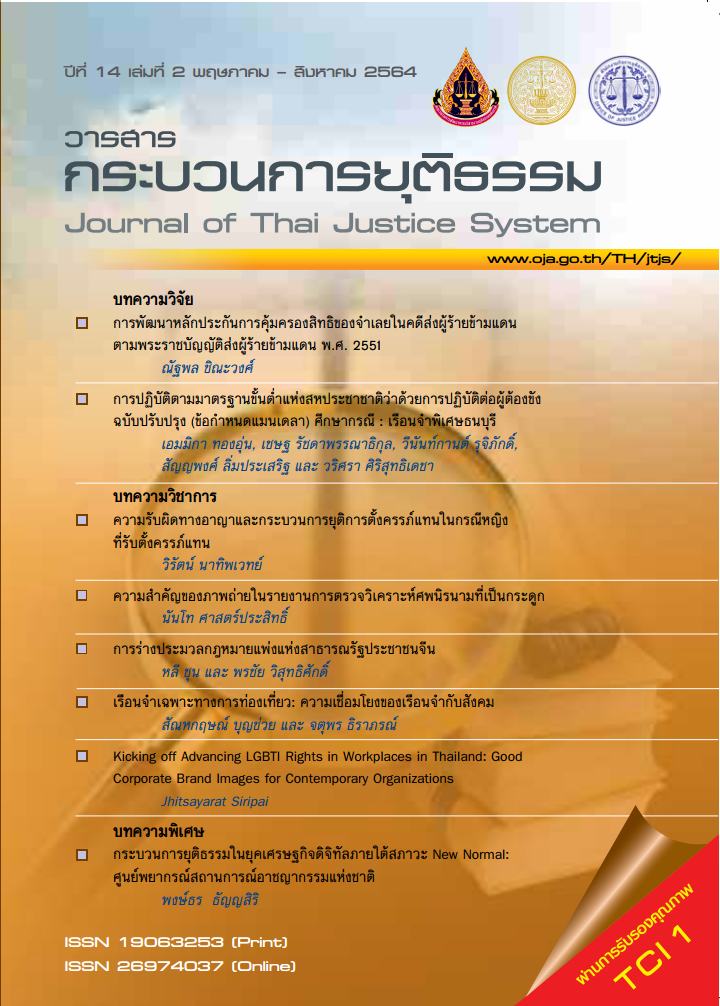การปฏิบัติตามมาตรฐานขั้นต่ำแห่งสหประชาชาติว่าด้วยการปฏิบัติต่อผู้ต้องขังฉบับปรับปรุง (ข้อกำหนดแมนเดลา) ศึกษากรณี: เรือนจำพิเศษธนบุรี
Main Article Content
บทคัดย่อ
การวิจัยครั้งนี้มีวัตถุประสงค์เพื่อศึกษาการปฏิบัติตามมาตรฐานขั้นต่ำแห่งสหประชาชาติว่าด้วยการปฏิบัติต่อผู้ต้องขังฉบับปรับปรุง (ข้อกำหนดแมนเดลา) ศึกษาปัญหาและอุปสรรค ที่มีต่อการปฏิบัติตามมาตรฐานขั้นต่ำแห่งสหประชาชาติว่าด้วยการปฏิบัติ ต่อผู้ต้องขังฉบับปรับปรุง (ข้อกำหนดแมนเดลา) และแสวงหาแนวทางในการปรับปรุงและเปลี่ยนแปลงการปฏิบัติตามมาตรฐานขั้นต่ำแห่งสหประชาชาติว่าด้วยการปฏิบัติต่อผู้ต้องขังฉบับปรับปรุง (ข้อกำหนดแมนเดลา) ของเรือนจำพิเศษธนบุรีซึ่งเป็นเรือนจำนำร่อง แห่งแรกของโลกที่นำการปฏิบัติตามมาตรฐานขั้นต่ำแห่งสหประชาชาติว่าด้วยการปฏิบัติต่อผู้ต้องขังฉบับปรับปรุง (ข้อกำหนดแมนเดลา) มาปรับใช้อย่างเต็มรูปแบบ เพื่อนำผลวิจัยที่ได้ไปเป็นแบบอย่างในการปรับปรุงและพัฒนาการปฏิบัติต่อผู้ต้องขังแก่เรือนจำอื่นๆทั่วประเทศไทย ให้มีความก้าวหน้าและมีความสอดคล้องกับมาตรฐานขั้นต่ำแห่งสหประชาชาติว่าด้วยการปฏิบัติต่อผู้ต้องขังฉบับปรับปรุง: ข้อหนดแมนเดลาต่อไป
โดยใช้ระเบียบวิธีวิจัยแบบผสม (Mixed Method) การวิจัยเชิงปริมาณ ประชากรที่ศึกษาเป็นเจ้าหน้าที่เรือนจำ จำนวนทั้งสิ้น 178 คน เก็บรวบรวมข้อมูล โดยใช้แบบสอบถาม สถิติที่ใช้ในการวิเคราะห์ข้อมูลได้แก่ ร้อยละ (percentage) ค่าเฉลี่ย (Mean) และส่วนเบี่ยงเบนมาตรฐาน (Standard Deviation: SD) การวิจัยเชิงคุณภาพ ประชากรที่ศึกษาเป็นผู้ต้องขังเรือนจำ จำนวน 5 คน และบุคคลที่ผู้บัญชาการเรือนจำมอบหมาย จำนวน 1 คน รวมจำนวนทั้งสิ้น 6 คน โดยวิธีสัมภาษณ์เชิงลึก
จากผลการศึกษาเกี่ยวกับการปฏิบัติตามมาตรฐานขั้นต่ำแห่งสหประชาชาติว่าด้วยการปฏิบัติต่อผู้ต้องขังฉบับปรับปรุง (ข้อกำหนดแมนเดลา) ของเรือนจำพิเศษธนบุรีจากข้อคำถาม 219 ข้อ พบว่า การปฏิบัติตามมาตรฐานขั้นต่ำแห่งสหประชาชาติว่าด้วยการปฏิบัติ ต่อผู้ต้องขังฉบับปรับปรุง (ข้อกำหนดแมนเดลา) ของเรือนจำพิเศษธนบุรี ทั้ง 7 ด้าน ได้แก่ 1. หลักการพื้นฐานของการปฏิบัติ 2.การปกป้องคุ้มครอง 3.สภาพทางกายภาพของการจำคุก 4.ความมั่นคงปลอดภัย การรักษาระเบียบและวินัย 5.ระบอบเรือนจำ 6.การดูแลสุขภาพ 7.เจ้าหน้าที่เรือนจำ พบว่าเรือนจำพิเศษธนบุรี สามารถปฏิบัติได้ครบถ้วน 215 ข้อ คิดเป็นร้อยละ 98.17 ปฏิบัติได้บางส่วน 4 ข้อ คิดเป็นร้อยละ 1.83 ไม่สามารถปฏิบัติได้เลย 0 ข้อ คิดเป็นร้อยละ 0
Article Details

อนุญาตภายใต้เงื่อนไข Creative Commons Attribution-NonCommercial-NoDerivatives 4.0 International License.
ต้นฉบับที่ได้รับการตีพิมพ์ในวารสาร เป็นลิขสิทธิ์ของวารสารกระบวนการยุติธรรม แต่ความคิดเห็นที่ปรากฏในเนื้อหาของบทความในวารสารกระบวนการยุติธรรม ถือเป็นความรับผิดชอบของผู้เขียนแต่เพียงผู้เดียว
เอกสารอ้างอิง
งามใจ ทวีชนม์. (2550). การศึกษาคุณภาพชีวิตการทำงานของข้าราชการกรมราชทัณฑ์. รัฐประศาสนศาสตรมหา บัณฑิต. มหาวิทยาลัยสุโขทัยธรรมาธิราช.
ธีรพงศ์ พงษ์ศิริเดชา. (2546). ทัศนะของเจ้าหน้าที่ราชทัณฑ์ต่อมาตรการการควบคุมและการแก้ไขฟื้นฟผู้ต้องขัง : ศึกษาเฉพาะกรณีเรือนจำกลางคลองเปรม. วิทยานิพนธ์มหาบัณฑิตคณะสังคมสงเคราะห์ศาสตร์. มหาวิทยาลัยธรรมศาสตร์.
นัทธี จิตสว่าง. (2542). หลักทัณฑวิทยา: หลักการวิเคราะห์ระบบงานราชทัณฑ์. กรุงเทพฯ: มูลนิธิพิบูลสงเคราะห์.
บุญญาฤทธิ์ ศรีเอี่ยมโฉม. (2560). มาตรฐานการจัดสวัสดิการให้กับผู้ต้องขังเรือนจำจังหวัดชัยนาท.
สารนิพนธ์รัฐประศาสนศาสตรมหาบัณฑิต. มหาวิทยาลัยเวสเทิร์น.
ยศวรรธน์ การะเกตุ และคนอื่นๆ. (2558). คุณภาพชีวิตการทำงานของข้าราชการราชทัณฑ์ในกลุ่มจังหวัด“ร้อยแก่นสารสินธุ์”. วารสารการเมืองการปกครอง, 5(1), 148-165.
วัชราวุธ คาดประคอง. (2556). การปฏิบัติต่อผู้ต้องขังตามกฎมาตรฐานขั้นต่ำขององค์การสหประชาชาติ ศึกษากรณีเรือนจำจังหวัดอ่างทอง. วิทยานิพนธ์รัฐประศาสตรมหาบัณฑิต. มหาวิทยาลัยสุโขทัย ธรรมาธิราช.
สถาบันเพื่อการยุติธรรมแห่งประเทศไทย. (2560). ขับเคลื่อน “ข้อกำหนดแมนเดลา” เต็มรูปแบบครั้งแรกนโลกที่เรือนจำพิเศษธนบุรี. สืบค้น 5 มกราคม 2563, จาก https://bit.ly/3A05xwX
สุกฤตา เพชรหนองชุม. (2552). ปัญหาด้านสวัสดิการผู้ต้องขังสูงอายุในเรือนจำกลางคลองเปรม. กรุงเทพฯ: มหาวิทยาลัยธรรมศาสตร์.
อาภากร งามปลอด. (2558). การปฏิบัติตามมาตรฐานด้านคุณภาพชีวิตผู้ต้องขังเรือนจำกลางจังหวัดสุราษฎร์ธานี. สารนิพนธ์รัฐศาสตรมหาบัณฑิต. มหาวิทยาลัยธรรมศาสตร์.
เอมนิการณ์ อัครศิรพันธ์. (2558). สิทธิในการรับบริการของผู้ป่วยซึ่งเป็นผู้ต้องขังที่มารับบริการในโรงพยาบาลตำรวจ. สารนิพนธ์ศิลปศาสตรมหาบัณฑิต. มหาวิทยาลัยธรรมศาสตร์.
World Prison Brief. (2018). World prison brief data in Thailand. Retrirved May 3, 2020, from https://prisonstudies.org/country/thailand#further_info_past_trends


